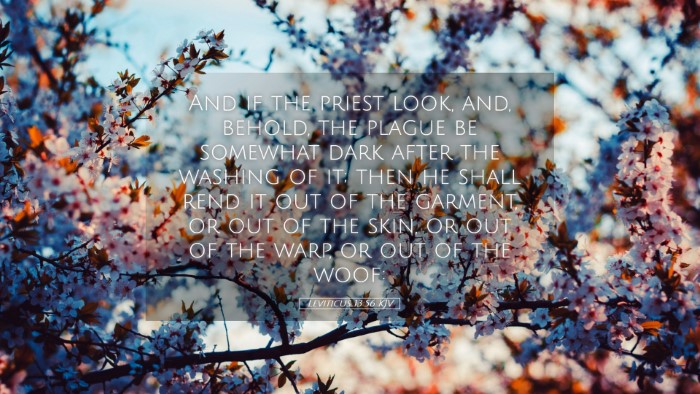Commentary on Leviticus 13:56
Leviticus 13:56 states: "And if the priest see that the plague is somewhat dark after the washing of it; then he shall rend it out of the garment, or out of the cloth, or out of the skin." This verse is situated within the broader context of the laws concerning leprosy and skin diseases, which are addressed in Leviticus 13-14. Here, we explore the significance and implications of this passage through synthesizing insights from notable public domain commentaries.
Understanding the Context
In order to grasp the depth of Leviticus 13:56, it is essential to understand its context within the Mosaic Law. The laws regarding leprosy served as both a physical and spiritual directive. They not only covered the specifics of cleanliness and disease but also pointed to broader themes of purity, community health, and social interaction.
The Role of the Priest
Matthew Henry emphasizes that the priest acted as a mediator between God and the people. In matters of disease, particularly those that might carry ceremonial implications, the priest’s role was to discern whether a plague was significant enough to declare a garment or a person unclean. His involvement underscores the seriousness with which Israel was to treat holiness and sin.
The Meaning of 'Somewhat Dark'
Albert Barnes notes that the phrase "somewhat dark" refers to the appearance of the plague after it has been washed. This detail relates to the procedures outlined for examining the nature of the plague. If the evidence persists in a darker form, it indicates that the disease has not been cleansed and requires further action. This instruction reflects a meticulous approach to health and hygiene which was vital for maintaining community sanctity.
Symbolism of Darkness
The imagery of darkness can symbolize sin or impurity. Adam Clarke suggests that as darkness represents the unholy or unclean, so does the persistent plague demonstrate an issue that cannot be overlooked. Thus, the priest's examination serves as a spiritual allegory for discerning moral and spiritual health within the community.
Procedures Following the Darkening of the Plague
Once the priest identifies the plague as "somewhat dark," immediate action is mandated: the plague must be 'rend out' of the source material, be it garment, cloth, or skin. The urgency of this measure illustrates the serious nature of uncleanness.
The Significance of Rending
Matthew Henry explains that to 'rend' signifies a definitive separation from that which is deemed unclean. This act serves not only to prevent the spread of the plague but also as a symbol of God's desire for purity among His people. Rending out the offending material is a strong reminder of the necessity of purity both physically and spiritually.
Covenantal Implications
The act of cleansing in Leviticus is deeply connected to the covenant that God established with Israel. As Albert Barnes notes, the requirements serve as external manifestations of internal loyalty to God’s commandments. Maintaining purity is a reflection of fidelity to the covenant, emphasizing the seriousness with which Israel was to uphold their identity as God’s chosen people.
Spiritual Application
The principles learned from Leviticus 13:56 extend beyond mere physical practices into the realm of spiritual health. The examination of ‘darkness’ can serve as a metaphor for sin in the life of believers.
Self-Examination
Adam Clarke encourages continual self-examination among believers, drawing parallels to the priestly duties. Just as the priest must examine manifestations of disease carefully, Christians are called to introspect and identify areas in their lives where sin may have taken root, potentially darkening their spiritual fabric.
Understanding Consequences
The act of 'rending’ is also significant in revealing the seriousness of sin and its consequences. The removal of sin, much like the rending of unclean material, must be decisive and often painful. It serves as a call for Christians to not only acknowledge but actively remove the presence of sin within their lives.
The Community Aspect
Moreover, maintaining purity is not only a personal endeavor but also a communal responsibility. Just as a physical plague can infect a community, so too can spiritual ailments spread among believers. Matthew Henry emphasizes the role of community in holding one another accountable in matters of purity and faithfulness to God.
Conclusion
In summary, Leviticus 13:56 offers rich insights into the importance of purity, both physically and spiritually. Its implications stretch beyond the Old Testament ceremonial laws and resonate deeply within the Christian context today. The responsibilities placed on the priest continue to echo the need for spiritual leaders to guide their communities in holiness and moral accountability. This call to vigilance regarding what is 'dark' serves as a powerful reminder for all believers to seek cleansing — both in their lives and within their circles — underscoring the necessity of maintaining a vibrant and pure relationship with God.


